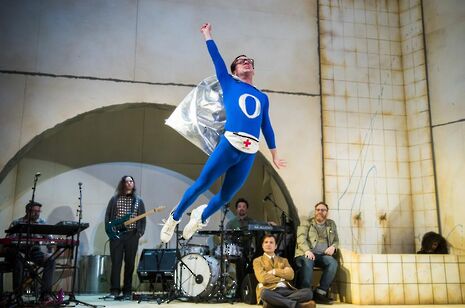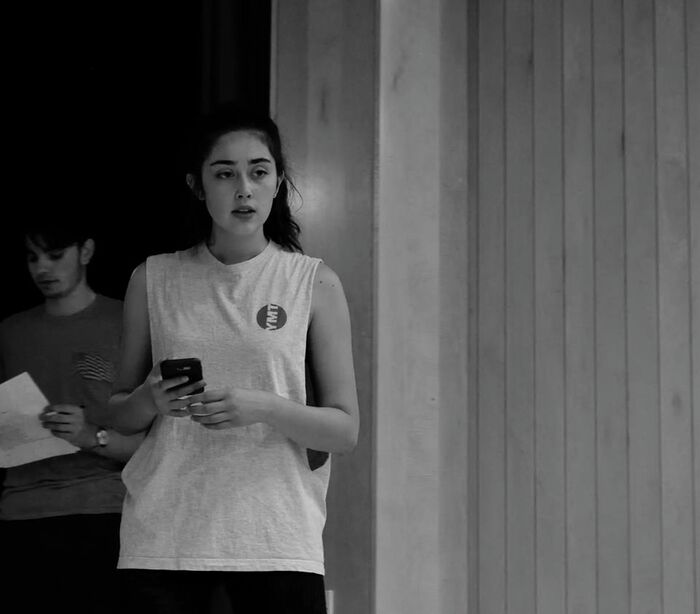A Midsummer Night’s Dream review: ‘a rebellious triumph’
This Arts Theatre show delights and entertains with deliberate silliness

A Midsummer Night’s Dream sits at the top of the table as the most performed Shakespeare play in modern theatre, so the task of retelling the tale in a way that has never been done before is certainly no mean feat. Filter has created A Midsummer Night’s Dream unlike any other, blending the original script with contemporary references, mixing live music with audio effects, breaking down barriers between the stage and auditorium (quite literally at times), and overall making this production a rebellious triumph.
The production manages to squirt every last drop of cream from the comic canister
We all know the basic story: young lovers flee to the forest, faeries “Puck up” spells, chaos and confusion ensues, and ultimately the promise that “all shall be well” is fulfilled. One might be surprised then by the way that this production inverts the typical arrangement of the lovers’ story taking precedence over that of the Mechanicals and faeries. By de-centring the plot, Filter’s production draws more attention to the play’s meta-theatrical elements and turns the spotlight onto some of Shakespeare’s finest comic creations.
The largely underrated character of Peter Quince is a prime example of a role which this production elevates and celebrates. Played excellently by Cambridge alumnus George Fouracres, Quince opens the show with an endearing nervous energy and sets off the laughter which continues almost incessantly for the following two hours. The rest of the Mechanicals are equally hilarious, and by giving them the time and freedom to develop their characters, the production manages to squirt every last drop of cream from the comic canister.
Another successful twist on convention comes from Sean Holmes’ direction of the troublesome duo, Oberon and Puck. Rather than Oberon being a domineering figure of authority, the costume design presents his character as a wannabe superhero; he bounces about the stage dressed in a bright blue bodysuit with a white “O” across the chest, complete with a silver cape and Jeremy Scott Wings. Harry Jardine is gleeful in the role, injecting his performance with childish fancy as he flies across the stage on a wheely chair, supplying his own “whoosh” sound effects. Kayla Meikle similarly triumphs as Puck; instead of panicking upon realising that the spell has gone wrong, her character relishes the chaos, and Meikle’s infectious laugh invites the audience to applaud the confusion with her.
It is a joy to watch the company have an absolute blast together on stage
While the tiled bathroom area and numerous taps which made up most of the set seemed redundant, the simple backdrop allowed the cast to showcase their talent and provided a blank canvas on which the chaos could be splattered. The world was also largely created through live music and visual-audio effects, often created by characters on stage, which contributed to the overt theatricality of the play.
It is not surprising to hear that the rehearsal room followed the mantra of “playful irreverence”; from food fights to verbal spars, the mayhem on stage is unstoppable. It is a joy to watch the company have an absolute blast together on stage, and particularly for anyone involved in Cambridge theatre, the production is an encouraging demonstration of how much fun working in this daunting industry can be, and that wacky and experimental productions can be successful and widely appreciated.
The production could be criticised for marginalising the problems in the play, such as the mistreatment of women and the magic-induced relationship between Demetrius and Helena. However, it would seem unfitting or even inappropriate for the company to attempt to tackle these issues in a production which is so consciously silly. The show demonstrates exactly why plays are called ‘plays’, and feels more like a much needed exam term regression session than a piece of theatre. By encouraging the audience to follow the lovers and Mechanicals in escaping real world responsibilities and immerse themselves in play, Filter create a weird, wild, and wonderful dream which you will not want to wake up from.
A Midsummer Night’s Dream is on at the Cambridge Arts Theatre until 9 June
 Features / How sweet is the en-suite deal?13 January 2026
Features / How sweet is the en-suite deal?13 January 2026 Comment / Will the town and gown divide ever truly be resolved?12 January 2026
Comment / Will the town and gown divide ever truly be resolved?12 January 2026 News / 20 vet organisations sign letter backing Cam vet course13 January 2026
News / 20 vet organisations sign letter backing Cam vet course13 January 2026 Arts / Fact-checking R.F. Kuang’s Katabasis13 January 2026
Arts / Fact-checking R.F. Kuang’s Katabasis13 January 2026 Music / Inside Radiohead’s circle13 January 2026
Music / Inside Radiohead’s circle13 January 2026










